What to Expect After Tubal Reversal Surgery

A tubal ligation prevents pregnancy by blocking or sealing the fallopian tubes so that eggs can’t pass through them. It’s intended to be a permanent form of birth control, but some women find that they want to try to conceive even though they previously had their tubes tied.
If you had a tubal ligation but decide you want to have the procedure reversed, this may be possible by having tubal reversal surgery. In this procedure, which is also called tubal reanastomosis, the blocked segments of the fallopian tubes are rejoined to allow eggs to pass through. If you’re considering this procedure, it’s natural to want to know what to expect after tubal reversal surgery.
Before the Procedure
Before the procedure is done, your doctor determines if you have a good chance of getting pregnant if the procedure is reversed. Several different factors are considered such as your age, your body mass index (BMI) and whether there are any problems that might cause infertility such as endometriosis or uterine fibroids. The type of tubal ligation that was done is also considered along with whether there’s enough healthy fallopian tube segments left to successfully reconnect. The health of your partner’s sperm is also considered,
The Procedure
This type of surgery is an outpatient procedure that usually takes about two to three hours. The blocked ends of the fallopian tubes are opened and reconnected. Dye is run through the tubes to confirm that the tubes are open. You’ll stay in the hospital for an hour or two after surgery and then you’ll be able to go home. You may have some discomfort at the incision site and you may have to rest for a week or two after surgery before returning to work.
Pregnancy After Tubal Reversal
Talk to your doctor about how soon you can start trying to get pregnant again after the incision has healed. Some women are able to conceive within a few months after surgery while others may take a year or more. There’s no guarantee that having a tubal reversal will result in a successful pregnancy, but women under the age of 35 have between 50 and 80 percent chance of becoming pregnant within the first two years after this type of surgery. Your chance of getting pregnant decreases with age and is typically less than 50 percent if you’re over the age of 40.
There’s a slightly increased risk of having an ectopic pregnancy once you’ve had this type of surgery. This means the fertilized egg could implant in the fallopian tube rather than the uterus.
Working With a Fertility Specialist
Tubal reversal may allow you to attain pregnancy without using fertility drugs. In vitro fertilization is another option that may help you to get pregnant after having your tubes tied. The best way to decide which is the best option for you is by talking to the fertility experts at the Center for Reproductive Health. Schedule an appointment for a consultation today.
Eliran Mor, MD
Reproductive Endocrinologist located in Encino, Santa Monica, Valencia & West Hollywood, CA
FAQ
Reproductive endocrinology and Infertility is a sub-specialty of Obstetrics and Gynecology. In addition to managing medical and surgical treatment of disorders of the female reproductive tract, reproductive endocrinologist and infertility (REI) specialists undergo additional years of training to provide fertility treatments using assisted reproductive technology (ART) such as in vitro fertilization.
Reproductive endocrinologists receive board certification by the American Board of Obstetrics and Gynecology in both Obstetrics and Gynecology and Reproductive Endocrinology and Infertility.
In general, patients should consider consulting with an REI specialist after one year of trying unsuccessfully to achieve pregnancy. The chance of conceiving every month is around 20%, therefore after a full year of trying approximately 15% of couples will still not have achieved a pregnancy.
However, if a woman is over the age of 35 it would be reasonable to see a fertility specialist earlier, typically after 6 months of trying.
Other candidates to seek earlier treatment are women who have irregular menses, endometriosis, fibroids, polycystic ovary syndrome (PCOS), women who have had 2 or more miscarriages, or problems with the fallopian tubes (prior ectopic pregnancy).
Approximately 1/3 of the time cause for infertility is a female factor, 1/3 of the time a male factor, and the remaining 1/3 a couples’ factor.
At CCRH, we emphasize the importance of establishing a correct diagnosis. Both partners undergo a comprehensive evaluation including a medical history and physical exam.
Furthremore, the woman’s ovarian reserve is assessed with a pelvic ultrasound and a hormonal profile. A hysterosalpingogram (HSG) will confirm fallopian tube patency and the uterine cavity is free of intracavitary lesions. A semen analysis is also obtained to evaluate for concentration, motility, and morphology of the sperm.
Additional work up is then individualized to direct the best possible treatment option for each couple.
In vitro fertilization (IVF) is the process that involves fertilization of an egg outside of a woman’s body.
The process starts with fertility drugs prescribed to help stimulate egg development. In your natural cycle, your body is only able to grow one dominant egg, but with stimulation medication we can recruit multiple eggs to continue to grow. After about 8-10 days of stimulation, the eggs are surgically retrieved and then fertilized with sperm in a specialized laboratory. Fertilized eggs are then cultured under a strictly controlled environment within specialized incubators in the IVF laboratory for 3-5 days while they develop as embryos. Finally, embryos (or an embryo) are transferred into the uterine cavity for implantation.
Before deciding if IVF is the right choice, it’s important to sit down with an REI specialist to discuss available treatment options. For some people, other methods such as fertility drugs, intrauterine insemination (IUI) may be the best first choice treatment. At CCRH, we believe each individual couple is unique and not everyone needs IVF.
While not painful, the fertility medications may some side effects including headaches, hot flashes, mood swings, and bloating. The injection sites may also bruise.
Unfortunately, no. Many people think once they start IVF it’s a matter of time that they will be pregnant and have a baby. But according to national statistics per the Society of Assisted Reproduction (SART), on average 40% of assisted reproduction cycles achieve live births in women under age 35. The chances of success then continue to decrease with advancing age.
At CCRH, we employ only evidence-based interventions to ensure patient safety and optimal outcome. While we cannot guarantee a baby, we guarantee that you will receive the best, most advanced, personalized care to help you maximize your chance of a baby.
The average IVF success rate (success measured in live birth rate) using one’s own eggs begins to drop around age 35 and then rapidly after age 40. This is due to the decline in egg quantity and egg quality as a woman ages.
Our clinic’s success rate consistently beats the national average year after year.
Individual insurance plans often do not have any coverage for infertility treatments. If you have a group plan, you can call members services to see if they have coverage for infertility (including consultation/workup and IVF).
After your consultation with our REI specialist, one of our dedicated account managers with sit with you to go over the cost of treatment.




